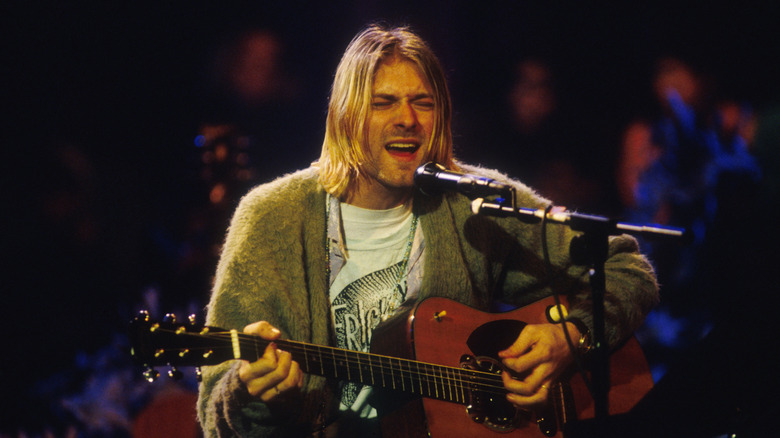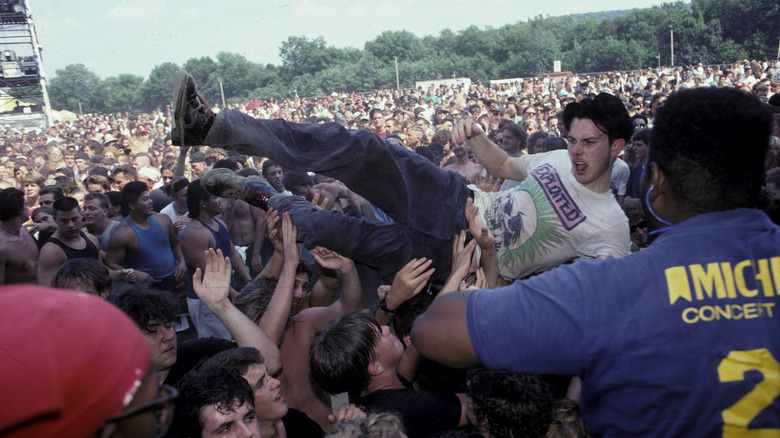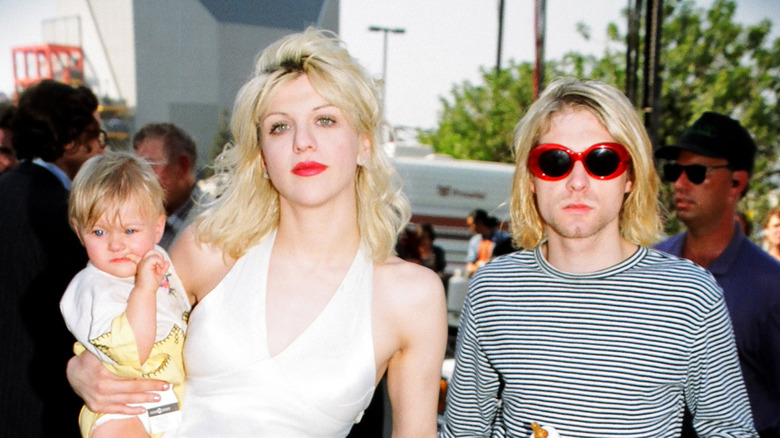Why Kurt Cobain Refused To Play At Lollapalooza In 1994
It's difficult to imagine today quite how seismic the influence of grunge rock band Nirvana and the band's mercurial frontman Kurt Cobain were when they first broke into the mainstream in the early 1990s after years of cult success in Seattle. Drawing on the oddball style of songwriting Cobain had grown to love through outsider artists like Daniel Johnston and adopting the dynamics of innovative late 1980s alternative band the Pixies, the band created a fresh sound that resonated with Generation X, the youth of the time.
In the grunge era, authenticity was the name of the game, and Nirvana had it in spades. Not only was their music raw and confessional, but Cobain and his bandmates, Krist Novoselic and Dave Grohl, were often found in the music press speaking without filter on the hypocrisy of the music industry and American society more generally. They also seemed to deal with their success in their own way, famously sabotaging their public platforms, such as the time they appeared on the BBC music show "Top of the Pops" and exposed the requirement to mime playing their instruments by playing robotically to the point of parody and smashing their equipment mid-performance.
And in 1994, the band went a step further by turning down their headline slot at Lollapalooza. Arguably the biggest alternative festival in the country at the time, the move surprised many fans and even the festival organizers, who seemed sure that Cobain himself was behind the decision. Instead, the truth was that the songwriter's life was falling apart, and the cancellation occurred in the context of Cobain's tragic death.
Lollapalooza and Kurt Cobain's fear of 'selling out'
Lollapalooza was founded in 1991 by Perry Farrell, the lead singer of the band Jane's Addiction, with the event originally planned as a farewell tour for the band, which was planning to split that year. Lollapalooza visited 20 cities in its first year, and its success soon saw it become a bastion of alternative music and culture.
In 1994, Nirvana was one of the biggest and most respected alternative rock bands in the world, and it seemed a surety that they would play Lollapalooza, an event with which, on paper at least, they appeared to have an affinity. Nirvana was everything to us," John Rubeli, a booker for the festival at the time, told People. "When you're alongside something that once in a generation, once in a lifetime, it just fulfills you in every way."
Though Nirvana was originally booked in for a headline slot in 1994, the band later cancelled their appearance. According to Rubeli, worries about authenticity were at the root of Cobain's misgivings about the event. "Kurt was terrified of selling out, and Lolla was a sellout moment, I think, for them. He very clearly at that point was talking about how he looked in the audience, and he saw all of the people that were beating him up in school." As such, it appeared Cobain decided to drop out.
The tragic context of Cobain turning down Lollapalooza
However, 1994 didn't just see Kurt Cobain struggling to decide the direction of his much-in-demand band. At the same time, his mental health was declining after years of drug use, including heroin. Following the wrap-up of a European tour at the start of the year, Cobain attempted suicide while on vacation in Rome with his wife, Courtney Love, after which he was met by an intervention in Seattle that saw him admitted to Exodus Recovery Center in Los Angeles for rehabilitation. On April 1, he escaped from the facility, causing a sensation within the alternative music community. His mother filed a missing persons report on April 4, but it was too late. On April 5, he died by suicide in the house he had bought in Seattle.
Indeed, at the time of his death, Nirvana was still billed as the Lollapalooza headliner. Their cancellation was only announced on April 6, before Cobain's remains were discovered on April 8. One Los Angeles Times report published on April 6 cited a source close to the band suggesting that the cancellation "could be a signal from the other members of the band that Kurt needs to focus on taking better care of himself."
"I had heard that Kurt escaped from a rehab and they were actually wondering if I knew where he was," Perry Farrell told People. "I did not know where he was, and then a few days later, they told me that he had shot himself."
If you or someone you know is struggling or in crisis, help is available. Call or text 988 or chat 988lifeline.org


